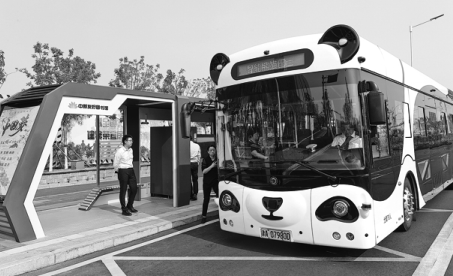Technology convergence to fuel breakthroughs in self-driving trucks

Commercialization of autonomous trucks and buses is expected to gain impetus amid ongoing efforts to make modern transportation safer, more efficient and less expensive for customers.
Plus.ai, an artificial intelligence startup, believes that huge opportunities exist in the self-driving trucks sector. Through a joint venture with FAW Jiefang, China's oldest and largest truck manufacturer, the company will help develop autonomous trucks for the domestic market.
The partnership, launched last year, was working on its first product, the FAW J7 Level 2 semi-autonomous truck, with plans to bring a full Level 4 heavy-duty truck that does not normally require human interaction in most circumstances, to market in three to five years.
The two companies have been working together over the last two years to address the growing demands for trucking in China, where over 6.1 trillion metric ton-kilometers of freight are moved by a fleet of more than 5 million heavy-duty trucks and over 14 million light and medium trucks, according to Plus.ai.
Plus.ai was one of the first companies to obtain an autonomous driving test license from the California Department of Motor Vehicles in early 2017. It was granted road test plate for autonomous driving trucks in Suzhou, Jiangsu province, in November, 2018.
In November 2019, the company got a license to test its self-driving heavy-duty trucks on public roads in the Yangtze River Delta region, encompassing Shanghai and the provinces of Zhejiang, Jiangsu and Anhui. It is also the first cross-provincial test license plate for unmanned heavy trucks.
"Thanks to the convergence of machine learning and AI, big data, mobility and advanced sensors, the autonomous revolution is on the horizon. Autonomous trucks are one of the best applications for autonomous driving in the near term, and are close to becoming a reality," said David Liu, founder and CEO of Plus.ai.
Liu said the country's logistics costs are still high, and more efforts are needed to promote the upgrading of industry, reduce costs and improve the efficiency. He said the large-scale use of autonomous driving technologies is conductive to making commercial freight transportation safer as well as lowering costs.
Applying autonomous driving technology to trucking will generate a multi-trillion-dollar economic effect, significant enough to reshape the transportation industry and its ecosystem, according to the company.
Founded in 2016 by a group of entrepreneurs and industry veterans with over 20 years of experience in high-tech and artificial intelligence, Plus.ai has become a world leader in self-driving truck technology. Based in the United States and China, the startup specializes in providing full-stack self-driving technology to enable large-scale autonomous commercial transport.
It has also completed the first coast-to-coast commercial freight run with an autonomous truck on behalf of Land O'Lakes, a US dairy products provider. Spanning 4,500 km, Plus.ai's L4 autonomous truck completed the hub-to-hub trip from Tulare, California to Quakertown, Pennsylvania, in less than three days.
A safety driver was onboard at all times to monitor and assume control if needed, and a safety engineer was present to monitor system operations.
DeepBlue Technology, a Shanghai-based AI startup, is committed to the expansion of research and development of AI and pressing ahead with its AI Panda Bus, which will reshape the environment of smart city public travel.
The AI Panda Bus is a large AI-enabled, autonomous driving, and luxurious heavy-duty commuter bus. Measuring a total length of 12 meters, it is powered by a lithium iron phosphate battery and has an autonomous driving level between L3 to L4.
The bus also boasts other AI technologies, such as biometric scanners, in-vehicle robot assistants, voice recognition, smart advertisement sensors, and in-vehicle cameras, all integrated into one single product.
The company said it got a license to test self-driving vehicles on designated roads in Shenzhen last month. The announcement came after central China's Changsha granted open-road test licenses to DeepBlue in April. Moreover, it has obtained such licenses in Guangzhou, Shanghai and Wuhan.
Founded in 2014, DeepBlue is sparing no effort in taking its smart transportation solutions overseas. Bangkok, the capital of Thailand and also one of the most densely populated travel cities, is in negotiations for the Panda Bus and has started cooperation with DeepBlue.
Chen Haibo, founder and CEO of DeepBlue, said in an earlier interview that countries such as Germany, Luxembourg, Italy and Greece have shown interest in Panda Bus.
Lin Jian, a senior engineer in the automobile engineering department at Tsinghua University, said: "We should be cautious about self-driving technology. Companies should invest and establish more testing sites that imitate different traffic scenarios, rather than testing their vehicles on the urban roads prematurely."

Today's Top News
- China sets a world record in maglev technology
- Xi chairs CPC leadership meeting on Party conduct, anti-corruption work
- Why Hainan Free Trade Port stands out
- Rule of law strengthens business environment
- Documents affirm one-China principle
- Central SOEs urged to push upgrading






























